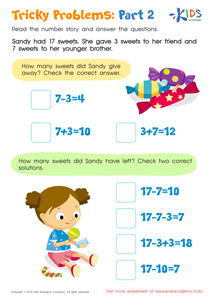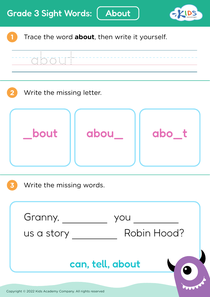Develop counting skills Grade 3 Adding up to 1000 Worksheets
3 filtered results
-
From - To
Boost your third grader's counting confidence with our engaging "Develop Counting Skills: Adding up to 1000 Worksheets." Designed for Grade 3, these worksheets help students practice addition skills up to 1000 through fun, interactive exercises. Each worksheet offers diverse problems that challenge young minds while reinforcing fundamental math concepts crucial for advanced learning. Ideal for both classroom and home use, these printable worksheets provide endless opportunities for practice, helping students to improve their counting abilities, accuracy and speed in calculations. Explore our collection and watch your child's mathematical proficiency flourish! Enhance learning today at Kids Academy!
Developing counting skills in third graders, especially the ability to add numbers up to 1,000, is crucial for several reasons. Firstly, it lays a strong foundation for future math learning. Proficiency in basic arithmetic operations is essential for understanding more complex mathematical concepts like multiplication, division, fractions, and algebra. Teaching these skills at an early age ensures that children don't struggle with advanced topics later.
Secondly, there is a direct correlation between mathematical skills and analytical thinking. Solving addition problems up to 1,000 enhances a child's problem-solving abilities and logical reasoning. These skills are not limited to mathematics alone but are transferable to other academic subjects and real-life situations, such as budgeting or time management.
Moreover, early success in math boosts a child's confidence. Children who develop strong counting and addition skills early on often show greater enthusiasm towards math. Positive experiences in the subject can lead to a lifelong interest in mathematics and other STEM fields.
Lastly, developing mathematical skills at a young age sets children up for academic success. Standardized tests and general academic assessments often include math competencies. Mastery of these early skills can thus significantly impact a child's academic performance and future educational opportunities, making it a critical aspect of their early education.













